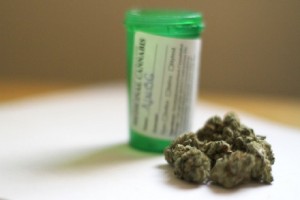DOH: Medical Marijuana Online Registry Accelerates Registration
Patient registration cards within the Hawai’i Department of Health’s medical marijuana program are now being issued quicker.
The department said Wednesday that the quicker processing is result of a new online registry, reducing the wait to three to five business days from the six to eight weeks it took when there was a patient backlog in 2015.
“Without compromising the integrity of our review process or the safety of Hawai’i’s people, we brought everything up to speed and improved our processing time so that patients can receive their registration cards faster,” said Scottina Ruis, medical marijuana registry program coordinator for the DOH.
According to Ruis, the new online registry system has benefits outside the wait time, like having the physician certify patients electronically and having registration cards sent directly to patients.
Prior to the new system, cards were mailed to the certifying physicians for their signature, then the certifying physician would give or mail the cards to their patients.
The use of the physician’s electronic signature during the registration process allows DOH to send the registration cards directly to the patients. Since the program requires that patients wait until they receive their registration card before they are authorized to use medical marijuana, the sooner they receive their card, the sooner they are protected by the program.
“Both patients and their physicians play a critical role in ensuring that registration cards can be issued promptly,” said Ruis. “Patients must make sure they complete the electronic registration form properly and submit all of the required documentation to their physician, electronically. Physicians must review the electronic registration form as well as electronically certify the patient’s condition before submitting the completed application to the Department of Health.”
The patient registration card includes information on the grow site, which permits a qualifying patient or care giver to grow up to seven plants, which must be properly tagged in order to remain in compliance with the program.
Inappropriately registered grow sites, unregistered grow sites, and improperly tagged plants are not protected by the program and are subject to confiscation by law enforcement agencies.
Just over a year ago, the oversight of the medical marijuana registry program transferred from the Department of Public Safety to DOH. At that time, there was 11,402 unduplicated registered patients in the program. In 2015, that number climbed, and currently, there are more than 13,000 valid patients.
“With the dispensary program targeted to be in operation as early as July 2016, medical marijuana will be more accessible,” said Ruis. “The online registration process is the first step to help ensure that we are ready for any increase in demand for registration cards.
“To be optimally functional, better able to service existing and new patients, physicians, law enforcement, and to be responsive to the larger community, we need additional staff. We hope to receive funding for an additional staff in the next fiscal year, which begins in July 2016. This will help ensure that we are able to maintain this positive momentum and the timing would coincide with the targeted launch of the medical marijuana dispensary program when demand for cards could potentially increase.”
As the department awaits the potential funding for additional staff, Ruis said, ways to enlist the support of more certifying physicians for the registration program are being sought.
DOH recommends that patients who feel they may be eligible for the program should begin the discussion with the physician that is currently treating them for the debilitating medical condition for which they are seeking certification.
Ruis said that it would be ideal that these physicians would seek continuing medical education courses specific to medical marijuana and how to best meet patient needs.
“Education is a critical component of the medical marijuana program. We hope to be actively involved at all levels – physicians, health care professionals, patients and caregivers, law enforcement, and the general public,” said Ruis.














